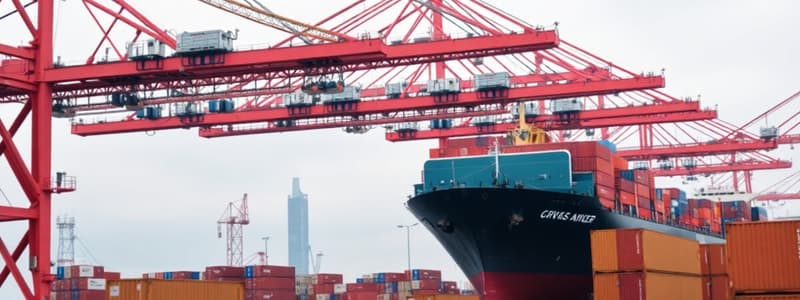Podcast
Questions and Answers
What is a primary benefit of globalization on supply chain networks?
What is a primary benefit of globalization on supply chain networks?
- Reduced flexibility in production capacity
- Lower risk and uncertainty in operations
- Opportunities to simultaneously increase revenues and decrease costs (correct)
- Increased supply chain complexity
According to the survey, which risk factor affects the highest percentage of global supply chains?
According to the survey, which risk factor affects the highest percentage of global supply chains?
- Performance of supply chain partners (correct)
- Logistics capacity/complexity
- Volatility of fuel prices
- Natural disasters
What is a common mistake companies make when offshoring?
What is a common mistake companies make when offshoring?
- Ignoring critical risk factors (correct)
- Minimizing the length of information flow
- Focusing on total cost rather than unit cost
- Reducing complexity in supply chain management
How does offshoring impact the flow of information, product, and cash?
How does offshoring impact the flow of information, product, and cash?
What drives the value of building flexible production capacity in a global supply chain?
What drives the value of building flexible production capacity in a global supply chain?
Which risk factor is directly associated with the transportation of goods?
Which risk factor is directly associated with the transportation of goods?
What aspect of global supply chains requires careful quantification and tracking over time?
What aspect of global supply chains requires careful quantification and tracking over time?
What does the text suggest is a crucial consideration when designing risk mitigation strategies for global supply chains?
What does the text suggest is a crucial consideration when designing risk mitigation strategies for global supply chains?
What is a typical effect of offshoring on supply chain visibility?
What is a typical effect of offshoring on supply chain visibility?
Which of the following is a potential impact of offshoring on unit cost?
Which of the following is a potential impact of offshoring on unit cost?
How does offshoring generally affect supply lead time?
How does offshoring generally affect supply lead time?
What impact does offshoring tend to have on on-time delivery?
What impact does offshoring tend to have on on-time delivery?
Which of these is a typical effect of offshoring on minimum order quantities?
Which of these is a typical effect of offshoring on minimum order quantities?
What is one of the primary effects of offshoring on inventories, as described in the materials?
What is one of the primary effects of offshoring on inventories, as described in the materials?
Which area is most likely to see higher costs due to hidden costs associated with offshoring?
Which area is most likely to see higher costs due to hidden costs associated with offshoring?
Which of the following is NOT a main element of total cost in global supply chain management?
Which of the following is NOT a main element of total cost in global supply chain management?
Which of these risks is directly related to fluctuations in currency values?
Which of these risks is directly related to fluctuations in currency values?
What impact can inaccurate forecasts have on a global supply chain?
What impact can inaccurate forecasts have on a global supply chain?
What is a key driver for supply chain risks classified as 'Disruptions'?
What is a key driver for supply chain risks classified as 'Disruptions'?
What is a mitigation strategy for 'capacity risk' in a supply chain?
What is a mitigation strategy for 'capacity risk' in a supply chain?
What tailored mitigation strategy is suitable for high-volume products when managing supply disruptions?
What tailored mitigation strategy is suitable for high-volume products when managing supply disruptions?
Which strategy is best for managing risk associated with intellectual property in a global supply chain?
Which strategy is best for managing risk associated with intellectual property in a global supply chain?
What is an effect of longer lead times on demand forecasts?
What is an effect of longer lead times on demand forecasts?
For short-life cycle products, which approach should be favored?
For short-life cycle products, which approach should be favored?
How should inventory strategy differ for predictable, lower value products versus less predictable, higher value products?
How should inventory strategy differ for predictable, lower value products versus less predictable, higher value products?
In the context of supply chain flexibility, what does 'mix flexibility' refer to?
In the context of supply chain flexibility, what does 'mix flexibility' refer to?
Which type of flexibility focuses on the ability to adjust production levels based on demand?
Which type of flexibility focuses on the ability to adjust production levels based on demand?
What is a potential drawback of using a single, long supply chain, as opposed to multiple smaller ones?
What is a potential drawback of using a single, long supply chain, as opposed to multiple smaller ones?
When should capability be favored over cost in a supply chain?
When should capability be favored over cost in a supply chain?
Which of the following is NOT a type of decision that decision trees can help with in supply chain management?
Which of the following is NOT a type of decision that decision trees can help with in supply chain management?
What does discounted cash flow (DCF) analysis evaluate?
What does discounted cash flow (DCF) analysis evaluate?
What is the key principle behind the concept of discounted cash flow?
What is the key principle behind the concept of discounted cash flow?
What is the first step in performing a decision tree analysis?
What is the first step in performing a decision tree analysis?
Which factor is NOT considered when using decision trees to evaluate supply chain decisions under uncertainty?
Which factor is NOT considered when using decision trees to evaluate supply chain decisions under uncertainty?
According to the provided content, what does it mean to increase aggregation?
According to the provided content, what does it mean to increase aggregation?
Which decision represents the use of chaining in a supply chain?
Which decision represents the use of chaining in a supply chain?
What is the impact of higher supply chain flexibility on the marginal benefit?
What is the impact of higher supply chain flexibility on the marginal benefit?
When is flexibility and chaining in the supply chain most effective?
When is flexibility and chaining in the supply chain most effective?
Flashcards
Globalization's impact on Supply Chains
Globalization's impact on Supply Chains
The potential to simultaneously increase revenue and decrease costs, but also comes with added risks and uncertainty.
Risk Mitigation in Global Supply Chains
Risk Mitigation in Global Supply Chains
The difference between success and failure in global supply chains often lies in the ability to effectively incorporate risk mitigation strategies into the supply chain design.
Flexible Production Capacity
Flexible Production Capacity
The uncertainty of demand and price fluctuations emphasizes the value of building flexible production capacity to adapt to changing market conditions.
Comparative Advantage in Global Supply Chains
Comparative Advantage in Global Supply Chains
Signup and view all the flashcards
Reasons for Offshoring Failure
Reasons for Offshoring Failure
Signup and view all the flashcards
Complexity of Global Supply Chains
Complexity of Global Supply Chains
Signup and view all the flashcards
Quantifying Total Cost in Offshoring
Quantifying Total Cost in Offshoring
Signup and view all the flashcards
Risk and Cost in Offshoring
Risk and Cost in Offshoring
Signup and view all the flashcards
Total Cost
Total Cost
Signup and view all the flashcards
Offshoring
Offshoring
Signup and view all the flashcards
Order Communication Impact of Offshoring
Order Communication Impact of Offshoring
Signup and view all the flashcards
Supply Chain Visibility Impact of Offshoring
Supply Chain Visibility Impact of Offshoring
Signup and view all the flashcards
Raw Material Cost Impact of Offshoring
Raw Material Cost Impact of Offshoring
Signup and view all the flashcards
Unit Cost Impact of Offshoring
Unit Cost Impact of Offshoring
Signup and view all the flashcards
Freight Cost Impact of Offshoring
Freight Cost Impact of Offshoring
Signup and view all the flashcards
Supply Lead Time Impact of Offshoring
Supply Lead Time Impact of Offshoring
Signup and view all the flashcards
On-Time Delivery Impact of Offshoring
On-Time Delivery Impact of Offshoring
Signup and view all the flashcards
Minimum Order Quantity Impact of Offshoring
Minimum Order Quantity Impact of Offshoring
Signup and view all the flashcards
Product Returns Impact of Offshoring
Product Returns Impact of Offshoring
Signup and view all the flashcards
Inventory Impact of Offshoring
Inventory Impact of Offshoring
Signup and view all the flashcards
Working Capital Impact of Offshoring
Working Capital Impact of Offshoring
Signup and view all the flashcards
Hidden Costs of Offshoring
Hidden Costs of Offshoring
Signup and view all the flashcards
Supply Disruption Risk
Supply Disruption Risk
Signup and view all the flashcards
New product flexibility
New product flexibility
Signup and view all the flashcards
Mix flexibility
Mix flexibility
Signup and view all the flashcards
Volume flexibility
Volume flexibility
Signup and view all the flashcards
Long chains with demand uncertainty
Long chains with demand uncertainty
Signup and view all the flashcards
Fixed costs in long chains
Fixed costs in long chains
Signup and view all the flashcards
Coordination in long chains
Coordination in long chains
Signup and view all the flashcards
Flexibility and chaining effectiveness
Flexibility and chaining effectiveness
Signup and view all the flashcards
Decision tree
Decision tree
Signup and view all the flashcards
Decision tree step 1
Decision tree step 1
Signup and view all the flashcards
Decision tree step 2
Decision tree step 2
Signup and view all the flashcards
Decision tree step 5
Decision tree step 5
Signup and view all the flashcards
Decision tree step 6
Decision tree step 6
Signup and view all the flashcards
Discounted cash flows (DCF)
Discounted cash flows (DCF)
Signup and view all the flashcards
Discounted cash flow analysis
Discounted cash flow analysis
Signup and view all the flashcards
Time value of money
Time value of money
Signup and view all the flashcards
Study Notes
Impact of Globalization on Supply Chains
- Globalization creates opportunities to increase revenue and decrease costs, but also introduces significant risk and uncertainty.
- Success hinges on incorporating risk mitigation strategies into supply chain design.
- Demand and price uncertainty makes flexible production capacity valuable.
Global Supply Chain Risks
- A survey highlights several risks affecting global supply chain performance:
- Natural disasters
- Skilled labor shortages
- Geopolitical uncertainty
- Cargo terrorism
- Fuel price volatility
- Currency fluctuations
- Port/custom delays
- Consumer preference shifts
- Supply chain partner performance issues
- Logistics capacity/complexity
- Forecasting/planning accuracy
- Supplier planning/communication issues
- Inflexible supply chain technology
Importance of Total Cost in Offshoring
- Global supply chains with offshoring increase information, product, and cash flow length/duration.
- Managing such chains often costs more than expected.
- Offshoring's significant risk impacts total costs.
- Focusing solely on unit costs, without considering total costs, and disregarding risks are common factors contributing to offshoring failures.
Dimensions to Consider in Evaluating Offshoring Total Costs
- Table 6-2 details dimensions impacting offshoring total costs.
- Table 6-2 identifies activities and their impact on various performance dimensions during offshoring.
- Communication difficulties, poor visibility, potential shifts in raw material costs, lower unit costs but potential quality issues, higher freight costs, tax/tariff complexities, longer lead times are some examples.
- Increased inventories, working capital, and hidden costs are also noted potential outputs.
- Stockouts, a major consequence of reduced visibility is another risk factor.
Key Elements of Total Offshoring Costs
- Supplier price
- Terms including payment
- Delivery costs
- Inventory and warehousing costs
- Quality control costs
- Taxes, duties, and value-added taxes (VAT) and local incentives
- Risk management costs including procurement staff, broker fees, infrastructure, and tooling
- Exchange rate fluctuations that affect costs
Risk Management in Global Supply Chains
- Supply chain risks encompass disruptions, delays, demand fluctuations, price variations, and currency changes.
- Effective network design is crucial in mitigating risks.
- Every mitigation strategy involves costs and may introduce other risks.
- A combination of evaluated risk mitigation strategies and financial strategies (hedging) is recommended.
Tailored Mitigation Strategies (Table 6-4)
- Increased capacity: Decentralized, low-cost options for predictable demand; centralized, high-capacity for unpredictable needs.
- Redundant suppliers: More redundancy for high-volume products; centralized for low volume in flexible supplier options.
- Increased responsiveness: prioritizing cost over responsiveness for commodity goods; responsiveness over cost for short-life cycle products.
- Increased inventory: Decentralized for predictable, low-value products; centralized for unpredictable, high-value products.
- Increased flexibility: Cost over flexibility for predictable, high-volume, flexibility for unpredictable, low-volume products.. Centralization of flexibility in minimal, cost-effective locations is favorable.
- Demand pooling: Aggregation as unpredictability increases.
- Source capability: High capability over cost for high-risk, high-value products; cost over capability for low-value products. Centralizing high capability in flexible sources where possible.
Flexibility in Supply Chains
- Supply chain flexibility can be categorized as:
- New product flexibility (rapid introduction)
- Mix flexibility (diverse products)
- Volume flexibility (adjustable output)
- Increased flexibility often yields diminishing returns.
- Flexibility and longer supply chains are more effective for demand fluctuations than supply disruptions. Longer chains, though, increase fixed costs and make coordination more challenging.
Decision Tree Analysis for Supply Chains
- Decision trees help evaluate choices under uncertainty.
- Decision trees consider time factors (period T).
- Fluctuations in factors like currency, commodities, customer demand, politics, and regulations must be factored into analysis.
- Discounted cash flow (DCF) analysis assesses worth of future cash flows by discounting them.
Methodology for Decision Tree Analysis
- Define time period length (month/quarter) and total number of periods (T).
- Identify factors that fluctuate during T periods
- Establish uncertainty levels for factors.
- Identify discount rates for each period.
- Represent decisions on a tree, noting states, transitions and probabilities for future periods.
- Calculate optimal decisions and expected cash flow from period T backward to period 0.
Studying That Suits You
Use AI to generate personalized quizzes and flashcards to suit your learning preferences.




